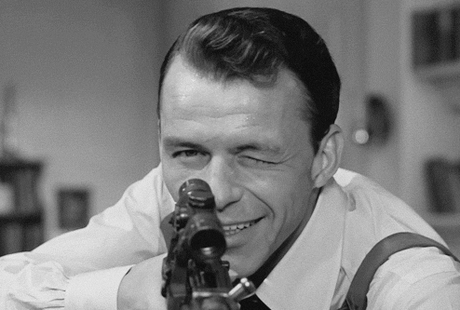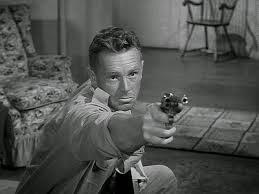
"When you have a gun, you are in a way sort of a God."
Suddenly (1954) was a minor Frank Sinatra film until the unspeakable happened. Lee Harvey Oswald caught it on television in November 1963, weeks before shooting John F. Kennedy. Sinatra, so the story goes, subsequently pulled the film (along with The Manchurian Candidate), which languished in obscurity before falling into public domain. Whether or not life imitates art, sometimes it proves too close for comfort.This tale may well be apocryphal, yet it explains Suddenly's obscurity as well as anything. Given a handsome Blu-Ray treatment in 2012, Lewis Allen's suspense flick anticipates a generation of tense assassination thrillers.
John Baron (Frank Sinatra) leads a hit squad into tiny Suddenly, California. The President's visiting by special train and Baron plans a warm reception. Posing as FBI agents, Baron and his henchmen stake out a house overlooking the rail yard, taking its occupants - old man Pops (James Gleason), war widow Ellen (Nancy Gates) and precocious kid Pidge (Kim Charney) - hostage. They also kidnap Sheriff Shaw (Sterling Hayden), who joins the Bensons to try outwitting the assassins.
Just 77 minutes long, Suddenly is a crisp, engaging thriller. Richard Sale's efficient script borrows from High Noon, from the real-time plotting to Ellen's intervention in the finale. If Suddenly has any politics they're very Cold War conservative; Baron works for unnamed benefactors, apparently a foreign government. We also receive lectures on the righteousness of firearms, the silliness of pacifism, and most of all female nagging, all conveniently embodied by Ellen. Exasperated with her whining, Pops implores her to "stop being such a woman!" Ouch!

Suddenly plays its suspense card perfectly. After some awkward stage-setting it becomes a chamber drama: Allen's claustrophobic, deep-focus direction keeps things engaging, while Sale makes brilliant use of limited setting. Baron's long-winded harangues occasionally grate (a sop to Sinatra's star image), yet Suddenly makes them Baron's Achilles heel. Similarly, a cap pistol and a hapless repairman (James O'Hara) provide handy set-ups for the finale. And Allen stage-manages a brilliant climax, with a head fake recalling Anthony Mann's The Tall Target.
Frank Sinatra relishes playing against type. He warps his customary charm into psychotic menace, all brusque swagger and psychotic rambling. Sterling Hayden provides stoic, clever counterpoint. Nancy Gates handles an irredeemable character reasonably well; James Gleason underplays his old man role; Kim Charney's an obnoxious Hollywood kid. Paul Frees, legendary voice over artist, plays one of Baron's accomplices. Willis Bouchey (The Man Who Shot Liberty Valance) plays a Secret Service agent.
Rarely remembered as a classic, Suddenly is both entertaining and unnerving. Later assassination films preferred elaborate conspiracies to lone nuts; Suddenly splits the difference, having a lone nut head the conspiracy. Viewed today, we can't help sensing premonitions of America's coming nightmare.

